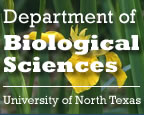MS in Environmental Science
Graduate Degrees in Environmental Sciences
Research Faculty:
Allen, Atkinson, Beitinger, Dickson, Huggett, Johnson, Kennedy, La Point, Roberts, Stevens, Thompson, Venables
Program Description
The Environmental science program is an interdisciplinary collaboration among the Department of Biological Sciences, the Department of Geography, the Department of Chemistry, the Department of Philosophy and Religion Studies, and other departments at UNT. The program offers graduate studies in Environmental science that lead to the MS and PhD, granted through the Department of Biological Sciences. The course of study, involving both core and elective courses, is designed to accommodate students having various backgrounds and interests in the natural, physical and social sciences who desire careers related to Environmental science. Students are trained to identify problems, collect and interpret data, and develop solutions to complex and challenging Environmental problems facing municipalities, industries, utilities and government agencies.
Visit www.biol.unt.edu or www.ias.unt.edu for more information on the diversity of research in the Environmental sciences, including aquatic biology, analytical chemistry, aquatic and terrestrial toxicology, ecology, ecophysiology, limnology, remote sensing and land use analyses, and Environmental modeling. Information on degree requirements follows the program descriptions.
Degree Programs
Master of Science (MS) in Environmental Science has two options: (1) a 36-hour scholarly research degree that requires 30 hours of organized course work, special problems, and seminars at the 5000 and 6000 levels, plus a 6-hour thesis; or (2) a 42-hour program of organized course work at the 5000 and 6000 levels. The thesis option includes a core of 19 or 20 semester hours (depending on which optional core courses are selected), with the remaining 16 or 17 semester hours selected from a list of electives. The non-thesis option includes a core of 25 to 28 semester hours (depending on which optional core courses are selected), with the remaining 14 to 17 hours selected from a list of electives. Each student must select the thesis or non-thesis option upon admission to the program and, with the guidance of a graduate advisory committee, develop an individual degree plan according to the student's area of interest. Only students who select the thesis option are eligible for teaching or research assistantships. Students completing the non-thesis option are not eligible for the PhD program in the Department of Biological Sciences.
